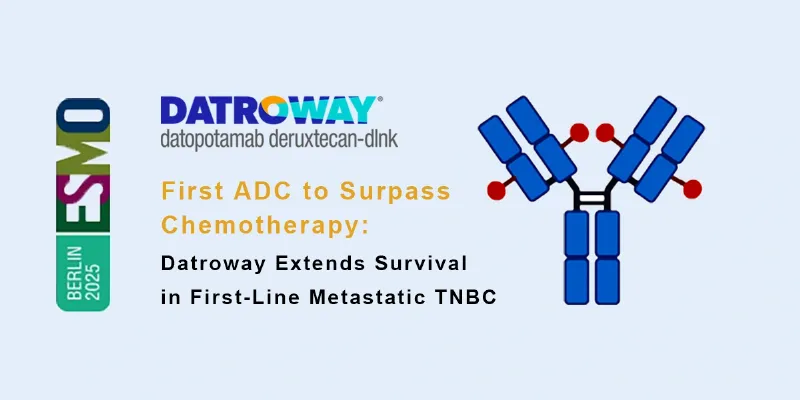Datroway Extends Survival by 5 Months in Metastatic Triple-Negative Breast Cancer

21 October 2025
Results from the phase 3 TROPION-Breast02 trial, presented at the ESMO 2025 Congress, show that Datroway® (datopotamab deruxtecan) significantly extended overall survival (OS) by five months and nearly doubled progression-free survival (PFS) versus chemotherapy in patients with metastatic triple-negative breast cancer ineligible for immunotherapy. Median OS reached 23.7 months with Datroway versus 18.7 months with chemotherapy, marking the first ADC to demonstrate a survival advantage in this setting.
The findings mark the first time an antibody-drug conjugate (ADC) has demonstrated a statistically significant overall survival benefit over chemotherapy in this difficult-to-treat population, establishing Datroway as a potential new first-line standard of care.
Clinically Meaningful Survival Gains
Among 644 patients enrolled globally, DATROWAY prolonged median OS by five months compared with investigator’s choice of chemotherapy (23.7 vs 18.7 months; HR = 0.79; 95% CI 0.64–0.98; p = 0.0291). Median PFS nearly doubled, reaching 10.8 months with DATROWAY versus 5.6 months with chemotherapy, representing a 43% reduction in risk of progression or death (HR = 0.57; 95% CI 0.47–0.69; p < 0.0001).
The objective response rate (ORR) was 62.5% with DATROWAY, including 29 complete and 173 partial responses, compared with 29.3% (8 CRs and 86 PRs) in the chemotherapy arm. Median duration of response exceeded one year (12.3 vs 7.1 months).
“DATROWAY meaningfully extended patients’ lives and nearly doubled their time without disease progression,” said Dr. Rebecca Dent, principal investigator and Deputy CEO of the National Cancer Centre Singapore. “These are significant outcomes for patients with metastatic triple negative breast cancer who are not suitable candidates for immunotherapy.”
A New Option for Patients Without Immunotherapy Access
TNBC is an aggressive subtype characterized by poor prognosis and limited treatment options. While immune checkpoint inhibitors have improved outcomes for PD-L1–positive disease, many patients remain ineligible due to PD-L1 negativity, prior immunotherapy exposure, or comorbidities.
DATROWAY’s benefit extended across subgroups, including patients with poor prognostic features such as stable brain metastases. As of the August 2025 cutoff, 14% of patients receiving DATROWAY remained on treatment, compared with 3% on chemotherapy.
“The TROPION-Breast02 results show for the first time that these TNBC patients may have an alternative to chemotherapy in the 1st-line setting that can both delay the progression of their disease and prolong their lives,” said Susan Galbraith, EVP, Oncology Haematology R&D, AstraZeneca. “For Datroway to have so significantly improved patient outcomes in the 1st-line metastatic setting as monotherapy also gives us great confidence in its potential in combination with Imfinzi, and in the early-stage, potentially curative setting where our next studies are ongoing.”
Safety Profile and Treatment Duration
Patients received DATROWAY for a median of 8.5 months, more than double the 4.1 months observed with chemotherapy. Grade ≥ 3 treatment-related adverse events (TRAEs) occurred in 33% of the DATROWAY arm and 29% of the chemotherapy arm.
Common grade ≥ 3 events included stomatitis (8% with DATROWAY, none with chemotherapy), neutropenia (3% vs 13%), and leukopenia (<1% vs 4%). Treatment discontinuations due to TRAEs were less frequent with DATROWAY (4% vs 7%).
One grade 5 interstitial lung disease (ILD) case was deemed drug-related, though the cause of death was attributed to disease progression. Overall, investigators reported a manageable safety profile, consistent with previous studies of datopotamab deruxtecan.
Broader Development Program
DATROWAY, a TROP2-directed DXd antibody-drug conjugate (ADC) jointly developed by Daiichi Sankyo and AstraZeneca, is already approved for HR-positive, HER2-negative breast cancer and EGFR-mutated non-small cell lung cancer. At ESMO, the companies also reported updated data from the BEGONIA phase 1b/2 trial, where DATROWAY combined with the PD-L1 inhibitor durvalumab showed robust antitumor activity as first-line treatment for metastatic TNBC, including PD-L1–high subgroups.
The TROPION-Breast02 results establish DATROWAY as the first therapy to demonstrate a significant overall survival benefit over chemotherapy in first-line metastatic TNBC for patients ineligible for immunotherapy. With robust efficacy, durable responses, and a manageable safety profile, DATROWAY could redefine the treatment landscape for this underserved population. If confirmed in ongoing studies, DATROWAY may soon represent a new first-line standard of care for patients with metastatic TNBC who cannot receive immunotherapy.
About the TROPION-Breast02 trial
TROPION-Breast02 is a global, multicenter, randomized, open-label phase 3 trial evaluating DATROWAY® (datopotamab deruxtecan) versus investigator’s choice of chemotherapy in 644 patients with previously untreated, locally recurrent inoperable or metastatic triple-negative breast cancer for whom immunotherapy was not an option. The study included both PD-L1–negative tumors and PD-L1–positive cases unable to receive immunotherapy due to prior treatment, comorbidities, or limited access. Dual primary endpoints were progression-free survival by blinded review and overall survival; secondary endpoints included ORR, duration of response, disease control, pharmacokinetics, and safety.











Comments
No Comments Yet!